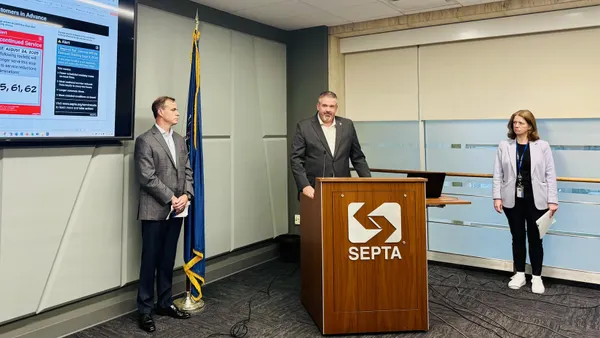Dive Brief:
- The Trump administration issued an executive order this month intended to streamline and strengthen oversight and coordination of the federal discretionary grantmaking process.
- The order directs federal agencies to review grant awards to ensure they meet the administration’s “priorities and the national interest” and assess their progress each year. It will also simplify the language on grant application questions, select applications that “advance the President’s policy priorities” and require agencies to reform their policies so the agencies can terminate grants that don’t meet the administration’s interests.
- Lobbying groups representing local and county governments say they believe the administration’s new policies could make obtaining grants more challenging.
Dive Insight:
The Aug. 7 executive order, Improving Oversight of Federal Grantmaking, is the latest of several Trump administration actions to block federal money from going to recipients or funding work that do not align with the Trump administration’s priorities.
The order takes aim at what the administration describes as “diversity, equity, and inclusion and other far-left initiatives.” It directs agencies to select discretionary grant applications that advance the Trump administration’s policy priorities and avoid projects that support race or gender, undocumented immigration and the existence of transgender people.
It also encourages providing grant funds to a broad range of recipients “rather than to a select group of repeat players.” Grant recipients will need to submit “written explanations or support, with specificity” before drawing down funds for each award.
The National Association of Counties, in an Aug. 19 post, stated that counties depend on federal grant funds to support a range of priorities including social services, health programs, public safety, disaster response and infrastructure investments.
“Changes to federal grant policy, especially ones that apply retroactively, may create unintended administrative or financial consequences when implementing these programs,” the organization stated.
A spokesperson for the National League of Cities said in an email that it is reviewing the full impact of the executive order on cities. The organization said it agrees the grantmaking process could be improved, but the executive order “adds to the bureaucratic process with more political reviews and another update to the Uniform Guidance which underpins all grants.”
The spokesperson added that the executive order falsely asserts that grants already in process “can be partially or fully terminated without a substantial cause.” That move, the NLC stated, is “counter to Congress’ Constitutional power of the purse.”
The NLC is trying to help cities overcome complex grant processes by training small and large communities to apply for and manage federal grants, the organization stated.
County leaders, meanwhile, are urging Congress and the administration to not cancel or freeze previously awarded funds and “support the stability and continued funding of critical projects and programs that have been properly approved, allocated and distributed,” NACO wrote.










